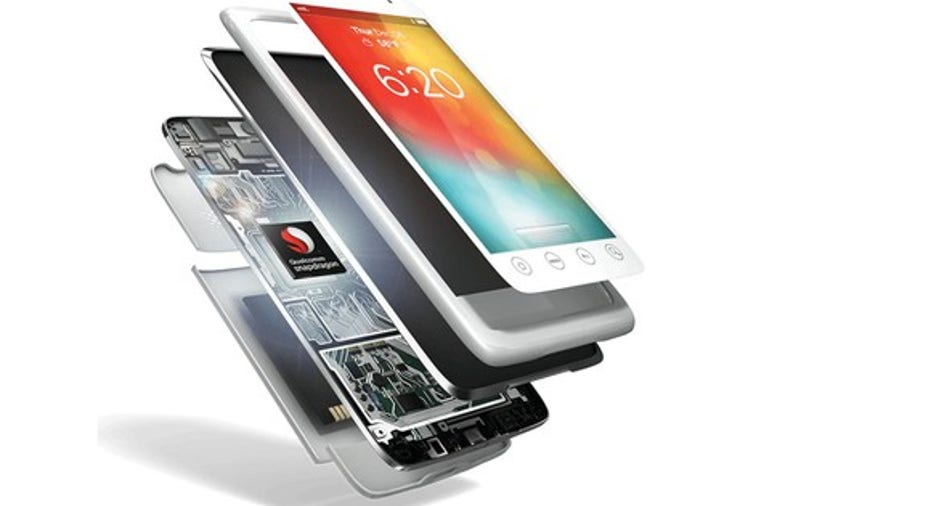What Happens to Qualcomm Inc. if the NXP Deal Gets Killed?

Shares of Qualcomm (NASDAQ: QCOM) have plunged nearly 20% since the beginning of the year due to a double whammy of bad news. First, the U.S. Federal Trade Commission filed an antitrust lawsuit against the chipmaker, claiming that itleveraged its portfolio of critical wireless patents to push competitors out of the market.Shortly afterwards, Apple sued Qualcomm for allegedly withholding "rebate" payments for its use of Qualcomm modems.
But that was just the tip of the iceberg -- Qualcomm has been struggling with other similar antitrust lawsuits across the world over the past two years. It was fined $975 million and forced to slash its licensing fees in China, fined another $854 million in South Korea, and could face up to $3 billion in additional fines in Europe and Taiwan.
Image source: Qualcomm.
However, the impacts of those fines and reduced licensing fees are overshadowed by a much bigger long-term risk -- the potential cancellation of itsplanned $47 billion acquisition of NXP Semiconductors (NASDAQ: NXPI). Let's see what could happen to Qualcomm if this massive deal gets derailed.
A brief look at Qualcomm's problems
Qualcomm has two main business units -- the chipmaking one (QCT) and the licensing one (QTL). The QCT unit, which sells its flagship Snapdragon mobile chips and baseband modems, generates most of its revenue. The QTL unit, which owns a massive portfolio of 3G/4G patents, generates most of its profits.
Both businesses have been under pressure over the past few years. The QCT unit has been losing market share to cheaper chips from challengers like MediaTek and first-party ARM chips from big OEMs like Apple, Huawei, Samsung, and Xiaomi. The QTL unit is struggling with the aforementioned regulatory scrutiny, since many OEMs consider its cut (up to5%) of the wholesale price of each smartphone sold to be too high.
To offset those declines, Qualcomm is diversifying the QCT business into adjacent markets, with specialized Snapdragon chips for wearables, drones, connected cars, and other Internet of Things (IoT) devices. A crucial part of this push is in the connected car, which is widely considered a next-gen computing platform. To gain a foothold in this market, Qualcomm acquired IoT andautomotive chipmaker CSR for $2.4 billion in 2015.
Why Qualcomm needs NXP
To expand further, Qualcomm agreed to buyNXPin order to also expand into new market -- namely automobiles. NXP became the top automotive chipmaker in the world after its $12 billion purchase of Freescale in late 2015. NXP also holds leading positions in the networking and safety systems markets. Qualcomm expects the combined company to generate annual revenues of over $30 billion (compared to Qualcomm's estimated revenue of $23.8 billion this year), and help it establish leading positions across the mobile, automotive, IoT, security, RF, and networking markets.
Qualcomm believes that the deal will grow its "serviceable addressable markets" by about 40% to $138 billion in 2020, and that the deal will be "significantly accretive to non-GAAP earnings immediately" after it closes. It expects the deal to generate $500 million in annualized run-rate cost synergies two years after the deal closes.
This deal will clearly help the QCT pivot away from the sluggish smartphone market. But it will also greatly expand the QTL's patent portfolio, which could enable Qualcomm to collect licensing fees across a much wider range of industries.
Why the deal could run into trouble
The FTC has already accused Qualcomm of charging competing baseband modem makers higher license fees for its wireless patents, which made their modems pricier for smartphone makers to use. Therefore, the FTC is unlikely to approve a deal which could give Qualcomm the same power over other growing markets like IoT devices and connected cars.
If the FTC lawsuit derails the NXP deal, Qualcomm will be left with a fading QCT business and a potentially crippled QTL one -- which would cripple the chipmaker's long-term growth prospects. Some analysts have speculated that Qualcomm might need to divest some businesses or split in two (along the QCT and QTL lines) to gain regulatory approval -- but splitting its low-margin and high-margin businesses could yield unpredictable results.
However, some analysts believe that the FTC will simply drop the case, since Maureen Ohlhausen -- a Republican who was recently appointed as the interim chairwoman by President Trump -- previously expressed herstrong opposition to the lawsuit. During last quarter's conference call, Qualcomm CEO Steve Mollenkopf expressed confidence that thedeal would close, and that recent legal actions were merely "driven by commercial disputes."
The key takeaway
As a Qualcomm investor, I'm disappointed with the recent legal actions against the chipmaker. While those moves might force Qualcomm to lower its licensing fees, I'm not convinced that they will derail the NXP deal. The risks have certainly gone up for Qualcomm, but I still believe that its forward P/E of 11 and 4% forward yield could limit its downside potential.
10 stocks we like better than Qualcomm When investing geniuses David and Tom Gardner have a stock tip, it can pay to listen. After all, the newsletter they have run for over a decade, Motley Fool Stock Advisor, has tripled the market.*
David and Tom just revealed what they believe are the 10 best stocks for investors to buy right now... and Qualcomm wasn't one of them! That's right -- they think these 10 stocks are even better buys.
Click here to learn about these picks!
*Stock Advisor returns as of January 4, 2017
Leo Sun owns shares of Qualcomm. The Motley Fool owns shares of and recommends Apple and Qualcomm. The Motley Fool has the following options: long January 2018 $90 calls on Apple and short January 2018 $95 calls on Apple. The Motley Fool recommends NXP Semiconductors. The Motley Fool has a disclosure policy.



















